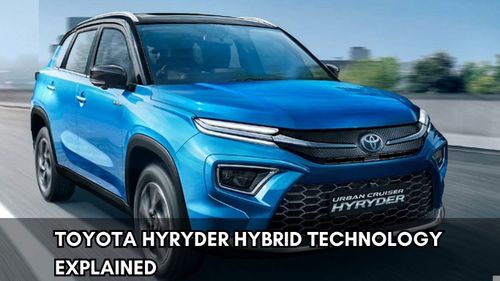Toyota Hyryder Hybrid technology explained
By Mohit Kumar

21039 Views
Learn how Toyota's pioneering hybrid systems deliver exceptional fuel efficiency, reliability, and a seamless driving experience.

Toyota's self-charging hybrid electric models have once again claimed the crown of reliability, achieving an impeccable 100% score in the prestigious 2019 What Car? Reliability Survey.
With feedback from over 18,000 British motorists, these results serve as a resounding testament to the enduring quality and durability of Toyota's pioneering hybrid technology, which first graced the roads back in 1997. It's clear that when it comes to dependability, Toyota Hybrids continue to lead the pack with unwavering confidence.
Toyota continually enhances its hybrid technology with each new generation of vehicles. Features such as regenerative braking, energy management systems, and efficient powertrains contribute to maximizing fuel efficiency and minimizing environmental impact.
Toyota Hybrids are renowned for their outstanding fuel efficiency. By combining an internal combustion engine with an electric motor, these vehicles achieve impressive mileage and significantly reduce fuel consumption, saving owners money at the pump.
In this article, we have explained all the pros and cons of the Toyota Hyryder.
Why People Hesitate to Buy Hybrid Cars?
The hesitation to purchase hybrid cars can be attributed to several factors:
Many people often hesitate when it comes to buying hybrid cars, and there are a few reasons behind this hesitation. Let's take a closer look at what these reasons are:
Price:
One of the main factors that may make people hesitant to buy hybrid cars is the initial cost. Hybrid vehicles generally have a higher price tag compared to traditional gasoline-powered cars. While the long-term savings on fuel and maintenance can make up for this difference, the upfront investment can be a deterrent for some buyers.
Limited Model Options:
Although the availability of hybrid models has increased in recent years, the selection is still somewhat limited compared to conventional cars. This can make it challenging for buyers to find a hybrid car that meets their specific needs and preferences.
Range Anxiety:
Some people worry about the limited electric range of hybrid cars. They may be concerned about finding charging stations or experiencing "range anxiety,", especially during longer trips. However, it's worth noting that plug-in hybrid vehicles with extended electric ranges have helped address this concern.
Lack of Infrastructure:
In certain areas, the infrastructure for charging electric vehicles, including hybrids, may be insufficient. Limited access to charging stations or a lack of public awareness about charging options can discourage potential buyers.
Performance Perception:
In the past, hybrid cars were often associated with slower acceleration and less engaging driving experiences. However, thanks to advancements in hybrid technology, many hybrid models now offer comparable power and responsiveness to their gasoline counterparts.
Maintenance and Repairs:
Some individuals may worry about the long-term maintenance costs and potential repairs associated with hybrid systems. However, hybrid vehicles have proven to be reliable, and their maintenance requirements are often similar to those of conventional cars.
Lack of Awareness and Misconceptions:
There may still be a lack of awareness and understanding about hybrid technology among consumers. Misconceptions about battery life, overall environmental impact, and the complexity of hybrid systems can contribute to hesitation when considering a hybrid car.
It's important to note that the automotive industry is actively addressing these concerns. Manufacturers are introducing more hybrid models, improving electric range, expanding charging infrastructure, and providing education to dispel misconceptions.
These efforts aim to encourage more consumers to consider hybrid cars as a viable and environmentally friendly transportation option. With ongoing advancements and increased awareness, the hesitation surrounding hybrid cars is gradually being overcome, paving the way for a greener future on the roads.
Pros
Exclusive 4-Wheel-Drive Option in the C-Segment SUV:
Toyota sets the Urban Cruiser Hyryder apart by offering a 4-wheel-drive option, a feature unique in the C-segment SUV category. This option is available specifically with the 1.5L mild-hybrid petrol manual powertrain. Additionally, the Hyryder offers snow and sport drive modes, along with a 4-wheel-drive lock mode for enhanced versatility.
Leading Fuel Efficiency and Reliability in the Segment:
The Toyota Urban Cruiser Hyryder hybrid stands out as one of the most fuel-efficient SUVs in the country, sharing this distinction with its Japanese counterpart, the Maruti Suzuki Grand Vitara. With an impressive claimed fuel efficiency of 27.97kmpl, the Hyryder hybrid delivers exceptional mileage. Moreover, Toyota's extensive experience in producing hybrid sedans and SUVs for over two decades ensures a high level of long-term reliability.
Extensive Features in Strong-Hybrid Variants:
Toyota has prioritized equipping the strong hybrid variants of the Urban Cruiser Hyryder with an extensive array of feel-good features. These desirable features include a tyre pressure monitoring system, ventilated seats, rear disc brakes, wireless phone charger, panoramic sunroof, full-colour LCD instrument cluster, head-up display, telematics, LED projector headlamps, a 360-degree camera, six airbags, ambient lighting, and illuminated boot, glovebox, and footwell areas.
Well-Equipped Base Variant:
Even the base variant of the Urban Cruiser Hyryder offers a commendable set of features. These include projector headlamps for enhanced visibility, vehicle stability control and hill-hold control for improved safety, chrome inside door handles for added sophistication, a front sliding armrest for increased comfort, automatic climate control for optimal cabin temperature, adjustable headrests for personalized seating positions, and a tilt & telescopic steering wheel for the ergonomic driving experience.
Cons
Impact of 17-Inch Wheels on Performance:
The Urban Cruiser Hyryder is equipped with 17-inch wheels as standard across all variants, including both mild-hybrid and strong hybrid powertrain options. However, the larger wheel size may have an impact on driveability and overall performance due to the higher rotating mass, particularly when paired with the less powerful mild-hybrid powertrain.
Feel-Good Features Exclusive to Strong Hybrid Variants:
While the Urban Cruiser Hyryder offers multiple feel-good features, it's important to note that many of these features are only available with strong hybrid variants. These desirable features include a tyre pressure monitoring system, ventilated front seats, a wireless phone charger, puddle lamps, and a colour LCD instrument cluster.
Missing Features in Comparison to Competitors:
In terms of features, the Urban Cruiser Hyryder falls short in comparison to its key rivals. Some notable missing features include a powered driver seat, autonomous driving assistance systems, and rain-sensing wipers, which are commonly offered by competitors in this segment.
Limited Engine and Transmission Options:
The Urban Cruiser Hyryder does not offer a diesel engine option. However, the strong hybrid powertrain compensates for this absence. It's worth mentioning that some rivals in the segment provide more powerful turbo petrol engines for enthusiasts, whereas the Hyryder features standard petrol engines. Additionally, the mild-hybrid powertrain of the Hyryder comes with a 5-speed manual transmission, while competitors offer a 6-speed manual transmission.
Compact Boot Space in Hybrid Variants:
The boot space in the hybrid variants of the Urban Cruiser Hyryder is relatively small, even when compared to B1-segment hatchbacks like the Maruti Suzuki Swift. Moreover, even the mild-hybrid variants compromise on boot space, offering the smallest boot capacity among its rivals.